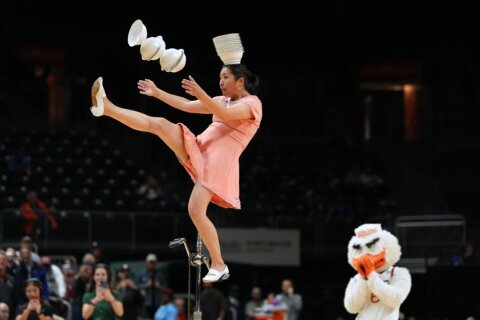More and more states around the country are legalizing sports betting, with visions of millions of dollars pouring into state and local government coffers. That’s especially true now that revenues have slowed because of the COVID-19 pandemic, and many local governments are staring at shortfalls.
Betting has been legalized in D.C.; voters in Maryland are in the process of deciding the question, and gaming companies are putting in their applications in Virginia.
But will it work? And how? And for whom?
This week, WTOP’s series “Betting on the Future: A look at sports betting in the DMV” is assessing the state of gambling in each area jurisdiction.
As more and more states and cities give the green light to sports betting, the days of bookies and backrooms likely will be replaced by partnerships between sporting venues and sportsbooks.
It has already happened here in Washington, D.C., where Ted Leonsis — the founder, chairman and chief executive officer of Monumental Sports & Entertainment, which owns the NBA Wizards, NHL Capitals, WNBA Mystics and Capital One Arena — was quick to embrace the idea that a sportsbook and a venue could work together.
Leonsis was an early advocate of taking sports betting out of the shadows and making the betting process more transparent and fan-friendly.
In October 2019, Leonsis announced a partnership with British bookmaker William Hill to establish a permanent sportsbook inside Capital One Arena.
“We don’t touch the money,” Leonsis said. “We rent William Hill space in the building and sell them sponsorship, but in terms of what the odds are or who missed the foul shot and what does it do to the spread, we have no say in that. The organization has been inoculated totally from what is happening in the gaming and the odds.”
At the end of July, William Hill opened a temporary sportsbook in the lobby of Capital One Arena in downtown Washington D.C., the city where in 2018 the U.S. Supreme Court struck down the Professional and Amateur Sports Protection Act, the 1992 federal law that effectively prohibited sports betting in all states outside of Nevada. The Capital One location was the first-ever sportsbook within a sports complex in the U.S.
“You drive by the arena and people are standing in line outside to get in,” Leonsis said. “The No. 1 complaint is that William Hill needs to open more windows. And when you look at the people who are in line, it is a very diverse audience and it’s a very young audience.”
WTOP SPECIAL SERIES: BETTING ON THE FUTURE
- Betting on the Future: Maryland makes plans for a windfall
- Betting on the Future: A question of competition in DC
- Betting on the Future: Going mobile in Virginia
- Betting on the Future: Where does all the money go?
- Betting on the Future: Ted Leonsis on bringing sports betting out of the shadows
Leonsis said the pop-up sportsbook has exceeded expectations, and William Hill reports over $21.3 million worth of bets have been placed in less than three months. Now, William Hill has announced it will continue to move forward with plans, slowed by the pandemic, for the company’s permanent facility inside Capitals One Arena at the former site of the Greene Turtle restaurant.
The sportsbook is designed to be an entertainment space with 1,500 square feet of LED screens, a Jumbotron on the second level and a radio and TV broadcast studio on the first floor. The sportsbook itself will include 12 ticket windows and 10 self-service kiosks, two VIP areas and a large private dining and event space.
With sports betting becoming legal in so many places, professional sports leagues are also getting involved. Leagues that Leonsis is involved with, the NBA and NHL, signed agreements to provide MGM Resorts International with data for use in betting. MGM will access the data through Sportradar, which provides services to national and international sports federations, media companies and bookmakers.
“I wish we wouldn’t call it gambling,” Leonsis said. “To me, gambling is rolling the dice. I have no control on the outcome. Sports betting is informed by data. The more research you do, the more due diligence you do, the more you study the smarter your bet will be. To me, sport gaming and gamification is a much more accurate description of what we’re going to see then ‘I’m rolling the dice; I hope everything turns out OK.’”
As 5G technology becomes more available and real-time connectivity increases, Leonsis believes, the number of betting options will also increase. Leonsis sees a day when fans watching sporting events either live or on television will be able to place wagers during timeouts on the outcomes of plays.
“Sports and technology are coming together in this new gaming process,” Leonsis said. “I think that connectivity and data, as well as all being activated by real-world community, and then watching these gifted athletes play, is going to continue to grow the sports business.”
Editor’s Note: WTOP’s Dave Johnson is also the radio voice of the Washington Wizards, a Monumental Sports and Entertainment property.






